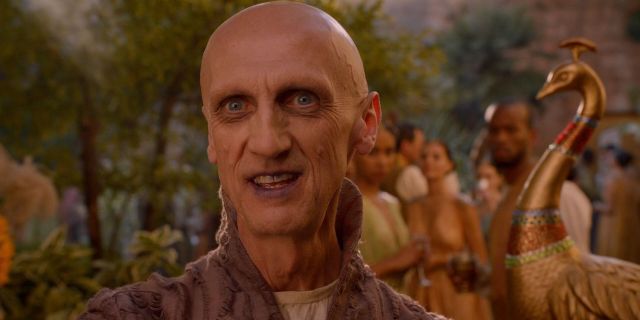Magic incontrovertibly exists in the Game of Thrones universe, but it’s as rare as it is complicated. It typically shocks the audience, eliciting responses like “They can do that?!” from a shocked crowd. Further frustrating matters, plenty of people fake mystical powers with little to show for them. It’s messy enough to leave ambiguity with almost every mysterious figure. The Warlocks of Qarth are likely the most fascinating examples. They’re visibly ineffectual, so why are so many people afraid of them?
The ensemble storytelling of Game of Thrones lets multiple characters explore different corners of the Known World. Daenerys enjoys a world tour, learning things firsthand other characters would only have seen in books. She’s rarely at war but almost always in danger. The Warlocks of Qarth are one of her many potential audiences, and as an old order obsessed with power and mysticism, their interaction goes poorly.
RELATED: Game of Thrones: The Three-Eyed Raven, Explained
What do Warlocks do?

Warlocks are mystics who follow ancient and mysterious traditions and claim tremendous magical powers. Their portrayal is radically different in the show than in A Song of Ice and Fire. Warlocks gather in a decrepit castle called the House of the Undying. Stories revere the warlocks as powerful seers, spellcasters, and magicians, but their prestige has declined over centuries. When Daenerys meets Pyat Pree and his leaders, the Undying Ones, their reputation is awful. Merchant Prince Xaro Xhoan Daxos warns Daenerys not to waste her time with warlocks. His summation is incisive:
Once they were mighty, but now they are as ludicrous as those feeble old soldiers who boast of their prowess long after strength and skill have left them. They read their crumbling scrolls, drink their shade-of-the-evening until their lips turn blue, and hint of dread powers, but they are hollow husks compared to those who went before.
In Game of Thrones, Pyat Pree exhibits magic powers. He summons duplicates and escapes a stab wound by teleportation, evoking Marvel’s Loki more than anything else. He’s much less impressive in the books. Pyat invites Daenerys to the House of the Undying. Against Xaro’s advice, she agrees to attend after the Pureborn refuse her. The warlocks briefly torment her before offering a mess of cloudy prophecies. She enters a room with a floating, pulsating, corrupted human heart. The warlocks try to drain her life force, but her young dragon, Drogon, destroys the heart and incinerates them. The Undying Ones are dead. Daenerys later learns that Pyat and the remaining warlocks have placed a curse on her, a seemingly severe threat. An assassin later attempts to kill her with a venomous insect, but Ser Barristan Selmy saves her. Any group of magic users who resorts to hiring a contract killer to solve a dispute will raise some eyebrows.
What is Shade of the Evening?

Shade of the evening is a beverage warlocks drink to open themselves up to extrasensory perception. They claim it allows them to hear whispers and see things beyond the eyes of others. The shade gives warlocks their distinct blue lips as its color gradually dyes their mouths. The Undying Ones, the oldest and most practiced magic-users, gradually become dark blue from head to toe. In the books, warlocks insist their guests imbibe the shade before entering the House of the Undying. Many believe consistent exposure to the shade might damage the warlocks’ brains. The drink comes from the dark blue leaves on trees outside their headquarters. Most known details suggest shade of the evening is a fun name for deadly nightshade. Atropa belladonna has a similar dark blue color and can cause hallucinations and delirium. Some have even taken nightshade as a recreational drug, though few survive. Shade of the evening could provide some power, but it is almost certainly slowly killing its users.
What does Westeros think of Warlocks?

Many of the smallfolk in Essos fear the warlocks’ supposed power. The old continent tells stories of the glory days and keeps some of the civilians afraid. However, most voices in Westeros consider warlocks to be unhinged or untrustworthy. When Bran mentions warlocks in the east, his teacher shuts him down, clarifying that the term is self-proclaimed. Euron Greyjoy, the mighty captain of the Silence, seems to hold some faith in the warlocks. He captured three and kept them as slaves, abusing them to gain their gift of prophecy. He later attacked four on a ship leaving Qarth, killing one and feeding him to his cohorts. Some have heard rumors that his new warlock slaves are training him in black magic.
Warlocks clearly have some supernatural gifts, but their presence in the modern era is a shadow of their former prominence. Their weakness seems to be pride. If they had the wisdom and humility to hide and bide their time, only using their gifts in strategic strikes, they could influence the world from the comfort of their crumbling castle. Unfortunately for them, they attack Daenerys when she has dragons on her side and pay the ultimate price. Warlocks are a thing of the past, and they only have themselves to blame.











Leave a Reply